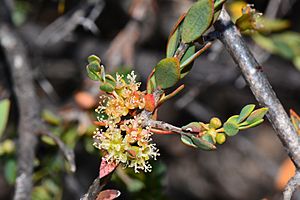Melaleuca pauciflora facts for kids
Quick facts for kids Melaleuca pauciflora |
|
|---|---|
 |
|
| Melaleuca pauciflora near Ashendon | |
| Scientific classification | |
| Genus: |
Melaleuca
|
| Species: |
pauciflora
|
| Synonyms | |
|
Melaleuca leptoclada Benth. |
|
Melaleuca pauciflora is a type of shrub that belongs to the myrtle family, called Myrtaceae. It is found only in the south-west part of Western Australia. This means it is endemic there, growing naturally nowhere else in the world.
You can tell this plant apart by how its leaves are arranged. They grow in opposite pairs, with each pair at a right angle to the one below it. This creates four neat rows of leaves along its branches. It also has small groups of white flowers that grow on the sides of its branches.
Contents
About the Melaleuca pauciflora
Melaleuca pauciflora is a bushy shrub. It usually grows to be about 3 m (10 ft) tall. Its leaves are arranged in a special way. They grow in pairs, with each pair turning at a right angle from the pair before it. This makes the leaves form four straight lines along the stems.
The leaves are small, usually 3–12 mm (0.1–0.5 in) long and 0.9–2.0 mm (0.04–0.08 in) wide. They are smooth, meaning they have no hairs, and are shaped like an oval, getting narrower at the end.
Flowers and Fruit
The flowers of Melaleuca pauciflora are white. They grow in small groups, each group being up to 6 mm (0.2 in) across. Each group has between 2 and 8 flowers. The petals are tiny, about 1–1.4 mm (0.04–0.06 in) long, and they fall off as the flowers get older.
Inside each flower, there are five groups of stamens. Stamens are the parts that produce pollen. Each group has between 2 and 7 stamens. The flowers usually appear in the summer. After the flowers, the plant grows small, woody fruits. These fruits are like little capsules, about 1.5–2 mm (0.06–0.08 in) in size.
Naming the Plant
The scientific name Melaleuca pauciflora was first officially given to this plant in 1847. It was named by a scientist named Nikolai Turczaninow. He wrote about it in a science journal called "Bulletin de la Société Impériale des Naturalistes de Moscou."
The second part of its name, pauciflora, comes from two Latin words. Paucus means "few" or "little," and flos means "flower" or "blossom." This name was chosen because the plant has small groups of flowers, and each group has only a few blossoms.
Where it Grows
Melaleuca pauciflora is found in a specific area of Western Australia. It grows between the city of Perth and the town of Albany. You can find it in different natural areas like the Esperance Plains, Jarrah Forest, Swan Coastal Plain, and Warren regions.
This plant likes to grow in sandy soil. It is often found in places that are wet during winter, such as estuaries (where rivers meet the sea), swamps, and other damp areas.
Conservation Status
The good news is that Melaleuca pauciflora is not considered to be in danger. The Government of Western Australia's Department of Parks and Wildlife has classified this species as "not threatened." This means there are enough of these plants in the wild, and they are not at risk of disappearing.

